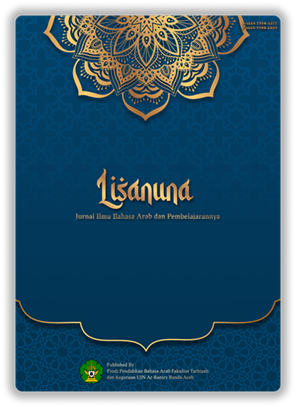PROBLEMATIKA LINGKUNGAN BAHASA ARAB DI PONDOK PESANTREN RAUDLATUL MALIKIYAH KETAPANG KOTA PROBOLINGGO
DOI:
https://doi.org/10.22373/ls.v13i1.18025Keywords:
Problems, Arabic language environment, Raudlatul Malikiyah Islamic Boarding School.Abstract
This research was motivated by the problem of the Arabic language environment in the Raudlatul Malikiyah Islamic Boarding School Ketapang Probolinggo City. The purpose of this study is to find out and analyze problems and solutions in the creation of an Arabic language environment at the Raudlatul Malikiyah Islamic Boarding School Ketapang Probolinggo City. The method used by researchers is qualitative method and data collection by: observation method, interview and documentation. The results showed that the creation of an Arabic language environment has not run optimally. This is because there are several obstacles that exist in the field such as the decline in the enthusiasm for learning students in Arabic in addition, the confidence to express Arabic sentences is very decreased, there are still some Ustadzah (Teacher) councils who are not in the field of Arabic have not used Arabic as the language of communication applied in pesantren, and many musrifah often use languages other than Arabic.
Downloads
References
Alfitri, A., Supriyady, H., & Saproni, S. (2020). Hambatan dalam Menciptakan Lingkungan Bahasa Arab di Pondok Pesantren Al-Munawaroh Pekanbaru. EL-IBTIKAR: Jurnal Pendidikan Bahasa Arab, 9(1), 212–220.
Aliyah, V. H., Maghfur, A. A., & Hilmi, D. (2019). Manajemen Perencanaan Program Bahasa Arab di Mayantara School Malang. Arabia, 11(1), 175–190.
Awwaludin, M., Malik, S., & Siswanto, N. D. (2022). Pembentukan Lingkungan Bahasa Arab Dalam Meningkatkan Penguasaan Bahasa Arab Pada Pesantren Bahasa Arab (MIM LAM). Definisi: Jurnal Agama Dan Sosial Humaniora, 1(1), 55–64.
Dhuhani, E. M. (2018). JURNAL; Manajemen pondok pesantren; studi pengelolaan santri muallaf di pondok Pesantren Al Anshar Ambon. Ambon, 9(1), 54–70.
Hamdi, M. M. (2021). Strategi Pemasaran Jasa Pendidikan Pada Pondok Pesantren. JIEM: Journal of Islamic Education and Manajemen, 2(1), 15–30.
Kahfi, S., & Kasanova, R. (2020). Manajemen Pondok Pesantren Di Masa Pandemi Covid-19 (Studi Pondok Pesantren Mambaul Ulum Kedungadem Bojonegoro). Pendekar: Jurnal Pendidikan Berkarakter, 3(1), 26–30.
Kariyanto, H. (2020). Peran pondok pesantren dalam masyarakat modern. Jurnal Pendidikan" EDUKASIA MULTIKULTURA", 2(2), 67–82.
Pratama, M. R. D., Ernawati, A., & Yulistiana, Y. (2018). Perancangan Pondok Pesantren Modern dengan Pendekatan Arsitektur Modern di Depok. Jurnal Desain, 5(02), 86–94.
Rivai, A., Lundeto, A., Ponny, M. R., & Piliang, I. P. (2021). Pembiasaan Berbahasa Arab Melalui Lingkungan Berbahasa Di Pondok Pesantren Assalam Manado. TARSIUS: Jurnal Pengabdian Tarbiyah, Religius, Inovatif, Edukatif & Humanis, 3(2), 19–26.
RIZQI, R. (2016). Peran Bi’ah Lughawiyyah dalam Meningkatkan Pemerolehan Bahasa Arab. Jurnal Alfazuna: Jurnal Pembelajaran Bahasa Arab Dan Kebahasaaraban, 1(1), 128–144.
Sa’diyah, M. (2020). SINERGITAS MUKHOYYAM ARABY DAN BI’AH ARABIYAH DALAM MENINGKATKAN MAHARAH KALAM MAHASISWA PBA IAIN JEMBER. International Conference of Students on Arabic Language, 4, 330–440.
Shidqi, M. H., & Mudinillah, A. (2021). Pembelajaran Bahasa Arab dengan Memanfaatkan Lingkungan Berbahasa Bagi Mahasiswa di Perguruan Tinggi. JURNAL EDUCATION AND DEVELOPMENT, 9(3), 170–176.
Taubah, M. (2017). Menciptakan Bi’ah ‘Arabiyah di Lingkungan Universitas yang Multikultural. Studi Arab, 8(2), 117–126.
Additional Files
Published
Issue
Section
License
1. Proposed Policy for Journals That Offer Open Access Authors who publish with this journal agree to the following terms:
1.a. Authors retain copyright and grant the journal right of first publication with the work simultaneously licensed under a Creative Commons Attribution License that allows others to share the work with an acknowledgement of the work's authorship and initial publication in this journal.
1.b. Authors are able to enter into separate, additional contractual arrangements for the non-exclusive distribution of the journal's published version of the work (e.g., post it to an institutional repository or publish it in a book), with an acknowledgement of its initial publication in this journal.
1.c. Authors are permitted and encouraged to post their work online (e.g., in institutional repositories or on their website) prior to and during the submission process, as it can lead to productive exchanges, as well as earlier and greater citation of published work (See The Effect of Open Access).
2. Proposed Policy for Journals That Offer Delayed Open Access Authors who publish with this journal agree to the following terms:
2.a. Authors retain copyright and grant the journal right of first publication, with the work [SPECIFY PERIOD OF TIME] after publication simultaneously licensed under a Creative Commons Attribution License that allows others to share the work with an acknowledgement of the work's authorship and initial publication in this journal.
2.b. Authors are able to enter into separate, additional contractual arrangements for the non-exclusive distribution of the journal's published version of the work (e.g., post it to an institutional repository or publish it in a book), with an acknowledgement of its initial publication in this journal.
2.c. Authors are permitted and encouraged to post their work online (e.g., in institutional repositories or on their website) prior to and during the submission process, as it can lead to productive exchanges, as well as earlier and greater citation of published work (See The Effect of Open Access).

